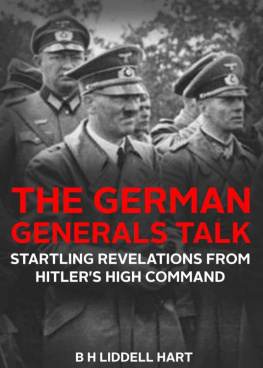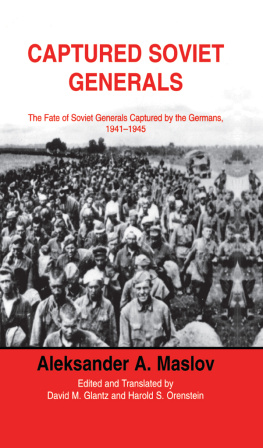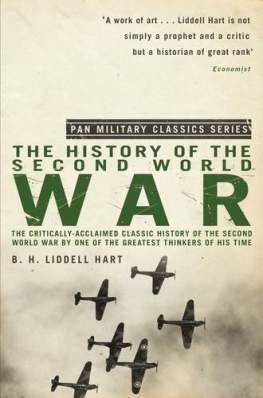Liddell Hart - The German generals talk
Here you can read online Liddell Hart - The German generals talk full text of the book (entire story) in english for free. Download pdf and epub, get meaning, cover and reviews about this ebook. City: Germany, year: 2002, publisher: Endeavour Press;Perennial, genre: History. Description of the work, (preface) as well as reviews are available. Best literature library LitArk.com created for fans of good reading and offers a wide selection of genres:
Romance novel
Science fiction
Adventure
Detective
Science
History
Home and family
Prose
Art
Politics
Computer
Non-fiction
Religion
Business
Children
Humor
Choose a favorite category and find really read worthwhile books. Enjoy immersion in the world of imagination, feel the emotions of the characters or learn something new for yourself, make an fascinating discovery.
- Book:The German generals talk
- Author:
- Publisher:Endeavour Press;Perennial
- Genre:
- Year:2002
- City:Germany
- Rating:5 / 5
- Favourites:Add to favourites
- Your mark:
- 100
- 1
- 2
- 3
- 4
- 5
The German generals talk: summary, description and annotation
We offer to read an annotation, description, summary or preface (depends on what the author of the book "The German generals talk" wrote himself). If you haven't found the necessary information about the book — write in the comments, we will try to find it.
The German generals talk — read online for free the complete book (whole text) full work
Below is the text of the book, divided by pages. System saving the place of the last page read, allows you to conveniently read the book "The German generals talk" online for free, without having to search again every time where you left off. Put a bookmark, and you can go to the page where you finished reading at any time.
Font size:
Interval:
Bookmark:
The German Generals Talk
B. H. Liddell Hart
Copyright B. H. Liddell Hart 1948
The right of B. H. Liddell Hart to be identified as the author of this work has been asserted by him in accordance with the Copyright, Designs and Patents Act, 1988.
First published in the United Kingdom in 1948 by Quill, New York.
This edition published in 2014 by Endeavour Press Ltd.
To my son, Adrian, and to all who helped in this effort to be of service to history
Table of Contents
Preface
When the war ended, I was fortunate in having an early opportunity of exploring the inside of the enemy camp to find out what had gone on behind the opposing front, and in the opponents mind. Some work I was doing for official quarters brought me in contact with the German generals and admirals over a lengthy period. In the course of many discussions with them I was able to gather their evidence on the events of the war before memories had begun to fade or become increasingly coloured by after-thoughts. It brought to light many secrets of the German command and its workings.
Understanding of what happened was helped by studying the German generals, as well as hearing their accounts. Few of them resembled the typical picture of an iron Prussian soldier. Rundstedt came nearest it, but in his case the impression was offset by his natural courtesy and light touch of humour. His quiet dignity in adversity and uncomplaining acceptance of hard conditions that were no credit to his captors won the respect of most British officers who encountered him. In contrast to him were a number of aggressive young generals, blustering and boorish, who owed their rise to Nazi favour. But the majority were of a different type to both, and by no means a dominating one. Many would have looked in their natural place at any conference of bank managers or civil engineers.
They were essentially technicians, intent on their professional job, and with little idea of things outside it. It is easy to see how Hitler hoodwinked and handled them, and found them good instruments up to a point.
In sifting and piecing together their evidence it was useful to have a background knowledge of the military situation in the pre-war period. It was a guide not only in saving time but in avoiding misconceptions that were still widely prevalent at the end of the war.
Between the wars, my work as a military correspondent required me to keep a watchful eye on developments in Europe, and I always sought to keep touch with the trends in Germany. This task was eased, directly and indirectly, by the extent to which my own military books were read in Germany, some of the leading soldiers themselves undertaking the translation.
The warnings I gave about the Nazi menace, and the emphatic line I took in opposing the policy of appeasement will be known to most of those who, in America as well as in Europe, followed my pre-war writings. I pointed out the ominous signs even before Hitler came into power. At the same time it was evident to me that the German General Staff had little influence with Hitler compared with what it had exercised in the Kaisers time, and that it tended to be more of a brake upon his aggressive plans than an impetus to them.
But the idea that the General Staff had played a dominant part in Germanys aggressive course, as it did before 1918, still coloured the prosecution proceedings at the Nuremberg trial. Earlier, that fixed idea had hindered the British and American governments from giving timely and effective encouragement to the underground movement in Germany which, with military backing, had long been planning Hitlers overthrow. That still prevailing conception of the General Staffs influence on policy was a long out-of-date notion. But legends are persistent, and delusions tenacious. They had the unfortunate effect of postponing Hitlers downfall and prolonging the war months, and probably years, after it would otherwise have ended. The ill-consequences for Europe are now beginning to be realised.
I would like to acknowledge my indebtedness to the help and historical sense of those who facilitated the early exploration of events. Also, to Captain F. S. Kingston, whose mastery of the German language and intuitive teamwork were of great assistance in the discussions. At the same time I would express my appreciation of the ready help given by so many of those in the other camp in contributing to this piece of historical research, and of the objective attitude most of them showed in discussing events. Finally, I wish to thank Major-General Sir Percy Hobart, Chester Wilmot, G. R. Atkinson and Desmond Flower for valuable comments and suggestions while the book was in preparation.
B. H. Liddell Hart
Part One Hitlers Generals
Chapter One The Suicidal Schism
Everything in war looks different at the time from what it looks in the clearer light that comes after the war. Nothing looks so different as the form of the leaders. The public picture of them at the time is not only an unreal one, but changes with the tide of success.
Before the war, and still more during the conquest of the West, Hitler came to appear a gigantic figure, combining the strategy of a Napoleon with the cunning of a Machiavelli and the fanatical fervour of a Mahomet. After his first check in Russia, his figure began to shrink, and towards the end he was regarded as a blundering amateur in the military field, whose crazy orders and crass ignorance had been the Allies greatest asset. All the disasters of the German Army were attributed to Hitler; all its successes were credited to the German General Staff.
That picture is not true, though there is some truth in it. Hitler was far from being a stupid strategist. Rather, he was too brilliant and suffered from the natural faults that tend to accompany such brilliance.
He had a deeply subtle sense of surprise, and was a master of the psychological side of strategy, which he raised to a new pitch. Long before the war he had described to his associates how the daring coup that captured Norway might be carried out, and how the French could be manoeuvred out of the Maginot Line. He had also seen, better than any general, how the bloodless conquests that preceded the war might be achieved by undermining resistance beforehand. No strategist in history has been more clever in playing on the minds of his opponents which is the supreme art of strategy.
It was the very fact that he had so often proved right, contrary to the opinion of his professional advisers, which helped him to gain influence at their expense. Those results weakened their arguments in later situations which they gauged more correctly. For in the Russian campaign his defects became more potent than his gifts, and the debit balance accumulated to the point of bankruptcy. Even so, it has to be remembered that Napoleon, who was a professional strategist, had been just as badly dazzled by his own success, and made the same fatal mistakes in the same place.
Hitlers worst fault here was the way he refused to cut his loss and insisted on pressing the attack when the chances of success were fading. But that was the very fault which had been most conspicuous in Foch and Haig, the Allied commanders of the last war, as well as in Hindenburg and Ludendorff, who then held the German Supreme Command. All these had been professional soldiers. Hitler also did much to produce the German armies collapse in France by his reluctance to sanction any timely withdrawal. But, here again, his attitude was exactly the same as that of Foch. The vital difference was that in 1918 the commanders on the spot did not obey Foch more than they deemed wise, whereas in 1944-45 the German generals were afraid to disobey Hitlers orders.
It is the cause of that fear, and the internal conflict in the High Command, that we have to probe in order to find the real explanation why the German plans miscarried. Hitlers strategic intuition and the General Staffs strategic calculation might have been an all-conquering combination. Instead, they produced a suicidal schism that became the salvation of their opponents.
Next pageFont size:
Interval:
Bookmark:
Similar books «The German generals talk»
Look at similar books to The German generals talk. We have selected literature similar in name and meaning in the hope of providing readers with more options to find new, interesting, not yet read works.
Discussion, reviews of the book The German generals talk and just readers' own opinions. Leave your comments, write what you think about the work, its meaning or the main characters. Specify what exactly you liked and what you didn't like, and why you think so.











